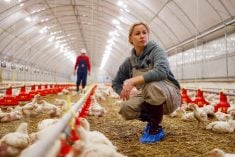The political battle over introduction of genetically modified alfalfa into Canada will be on display July 15 in Quebec City when anti-GM activists protest outside a Canadian Seed Trade Association meeting.
Inside a hotel perched on the edge of the historic Plains of Abraham, CSTA representatives on July 16 will hear an update on development of a “co-existence plan” outlining best practices to try to eliminate cross-contamination.
The plan has been completed after industry consultations last year.
The day before, the Quebec group Vigilance OGM is organizing a rally outside the hotel, claiming that the meeting will “finalize” the plan.
Read Also

B.C. ostriches culled, CFIA confirms
Ostriches on an embattled Edgewood, B.C. farm have been culled after a prolonged legal battle, the Canadian Food Inspection Agency has confirmed.
A statement on the rally noted that the CSTA membership includes major seed companies and some that are promoting GM alfalfa.
Vigilance OGM, an affiliate of the Canadian Biotechnology Action Network, argues that GM alfalfa will destroy the organic alfalfa industry.
“Coexistence or containment of GM alfalfa is not possible,” it said in a July 12 statement. “GM alfalfa will contaminate farmers’ fields and our food if it is released in Canada.”
CSTA president Stephen Denys from the Chatham, Ont., company Pride Seeds said in a July 12 interview the Quebec City meeting will not “finalize” anything.
A proposed plan has been developed through industry consultation and is considered in place.
“What is happening at the meeting relating to GM alfalfa is just an update and I think they are using that as a target for a protest,” he said. “There won’t be any broad discussion beyond that and no need for a vote.”
He said the CSTA executive invited the protest leaders for a meeting to discuss the issue but had not heard back by Friday afternoon.
Federal regulators approved the alfalfa GM trait five years ago but varieties containing the trait still will have to go through the registration process.
Commercializing companies led by Forage Genetics International have promised to wait for an industry developed ‘co-existence plan” before proposing introduction of varieties into the Canadian market.
It is now in place. “I assume they will have a timetable in place for commercialization at some point,” said Denys.
Industry officials insist the only varieties planned for now are hay varieties for Eastern Canada.
Varieties destined for prairie production would be more complicated because some of the western crop is exported, said the CSTA president.














